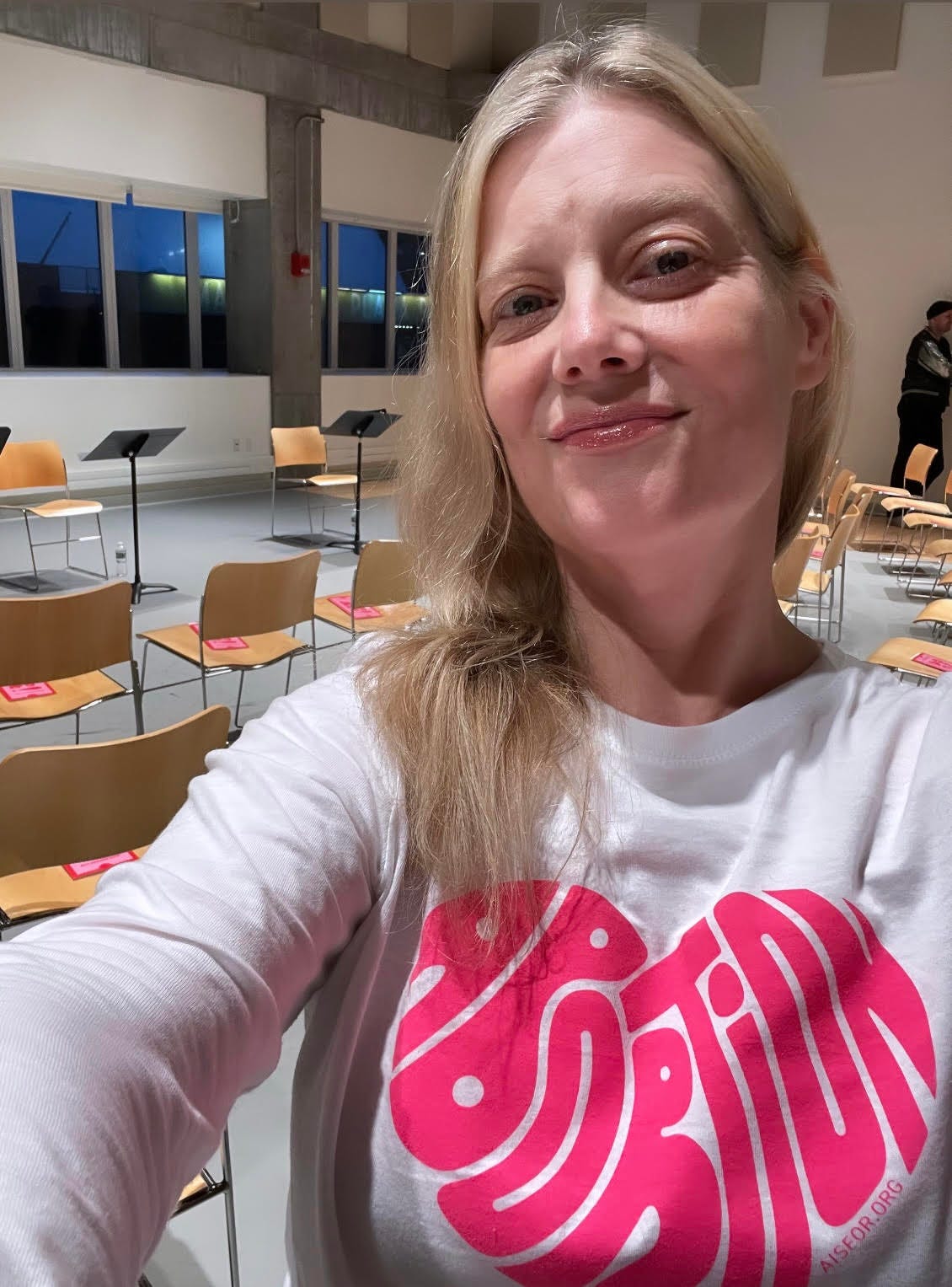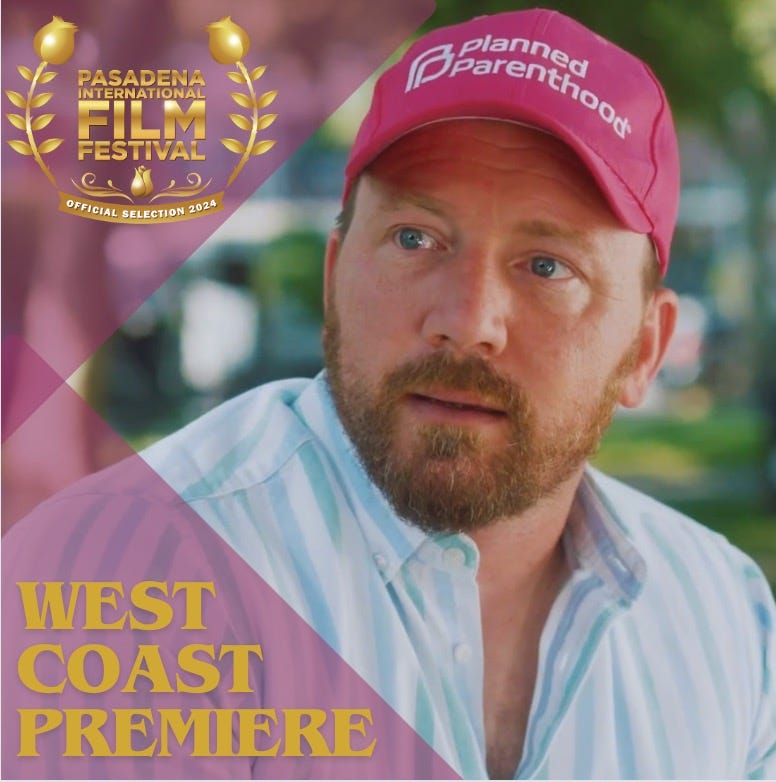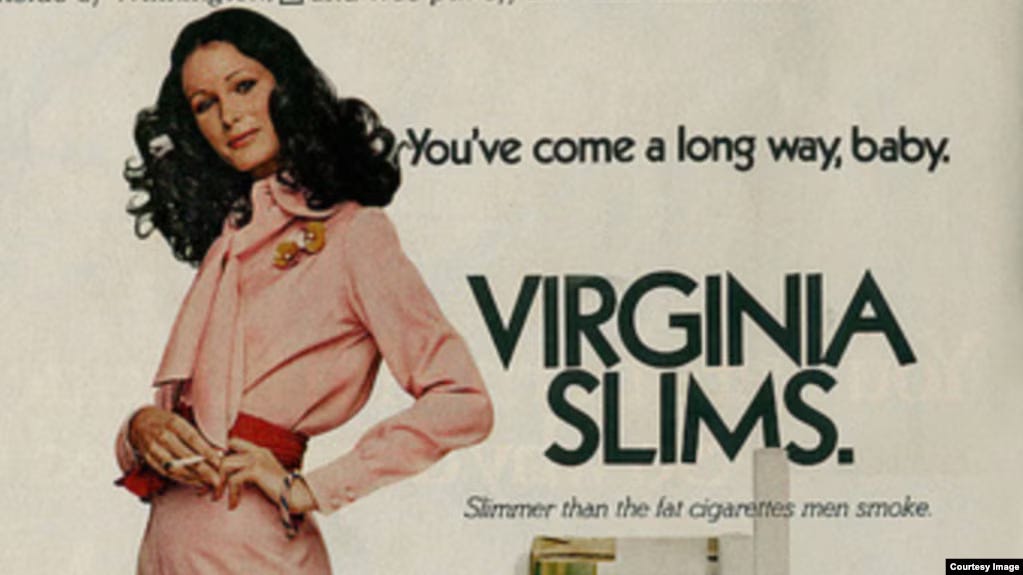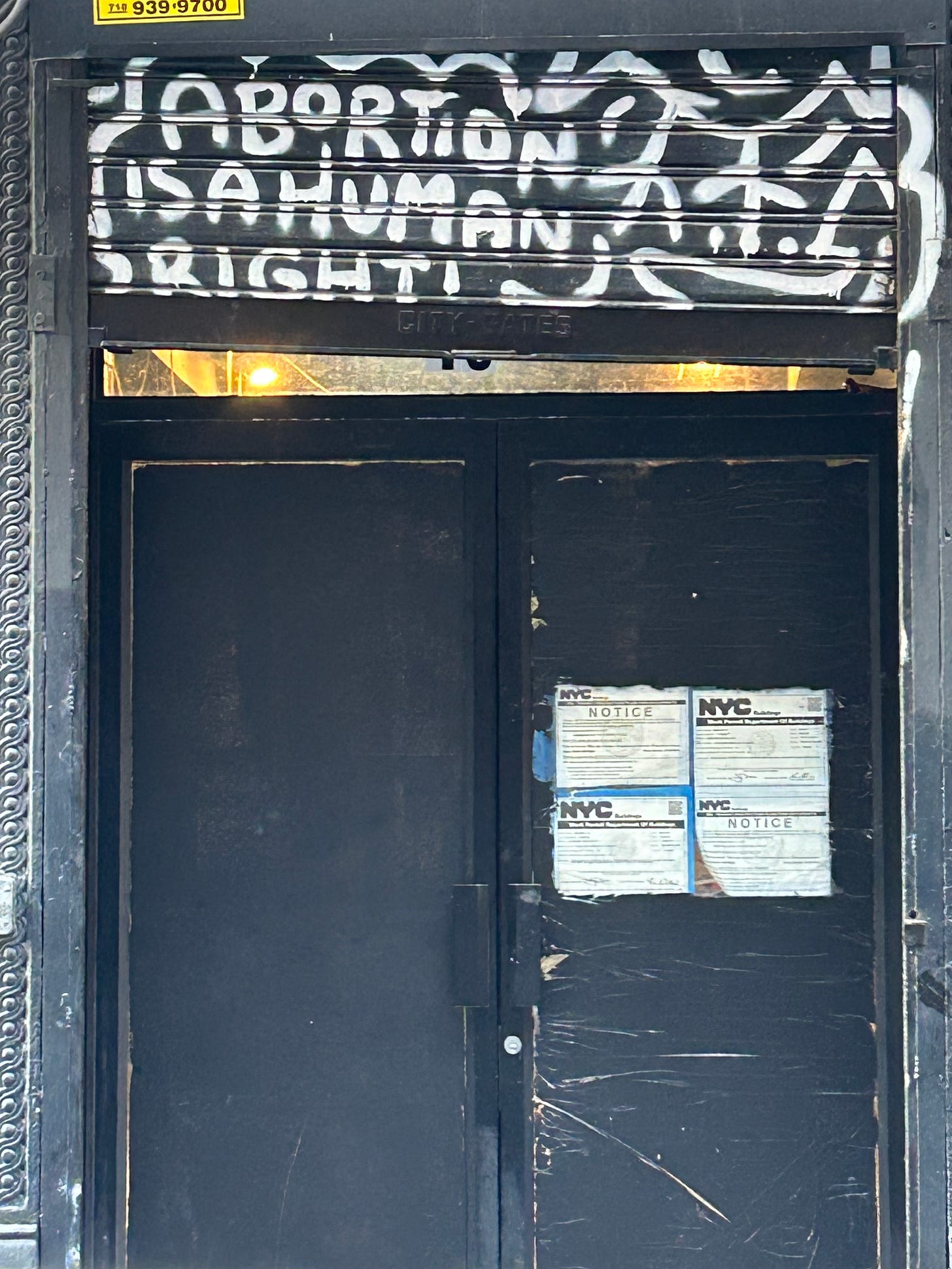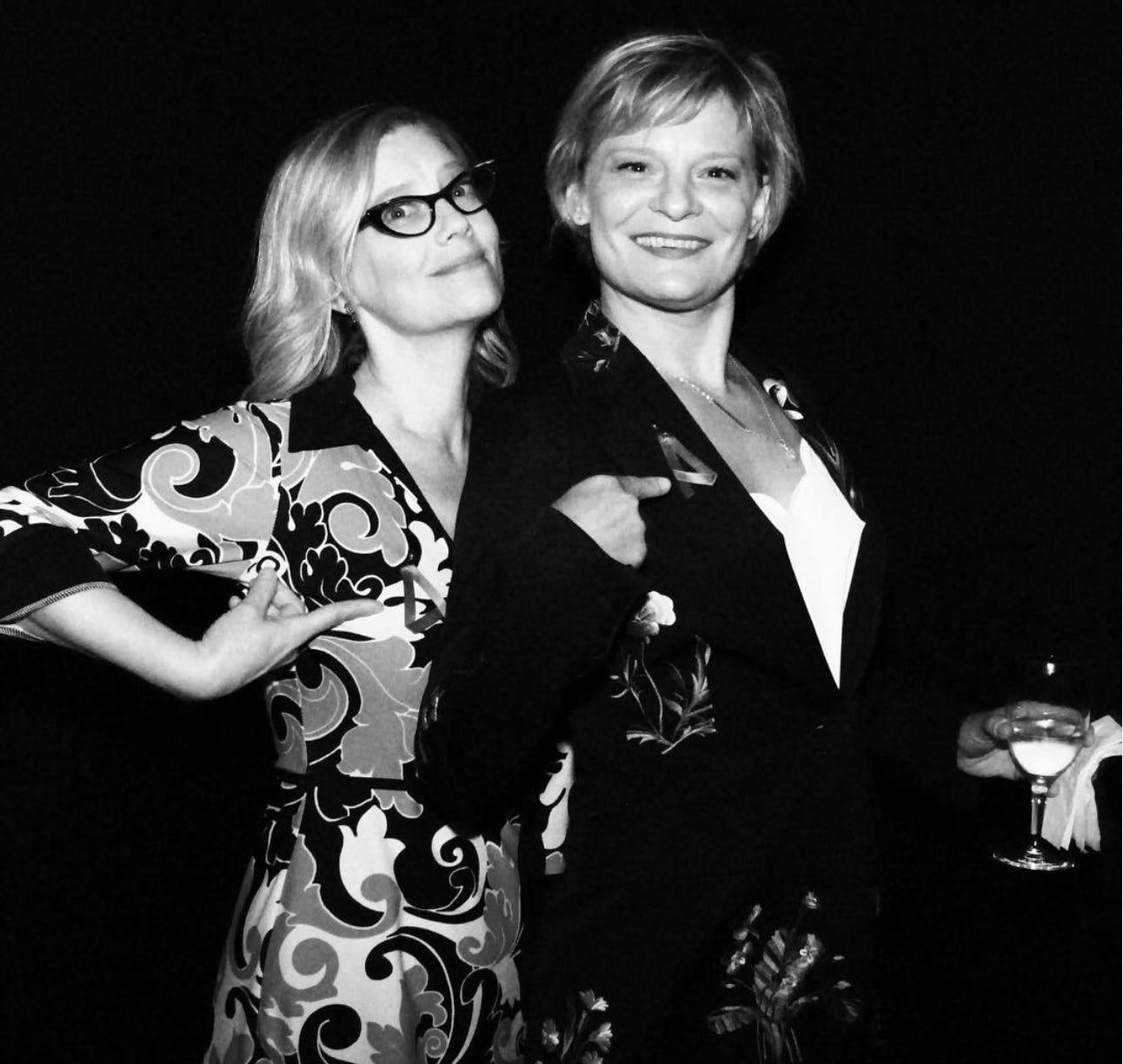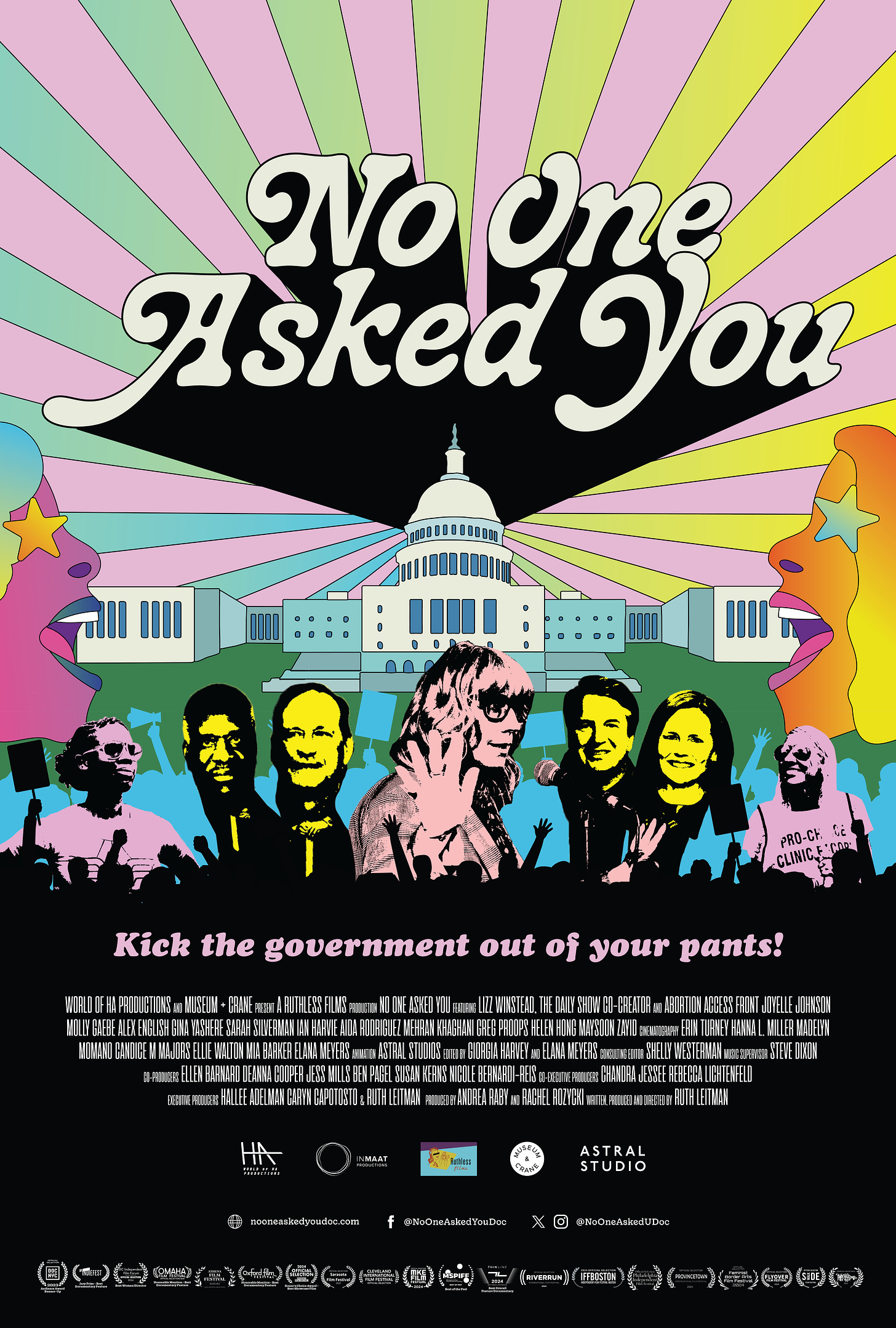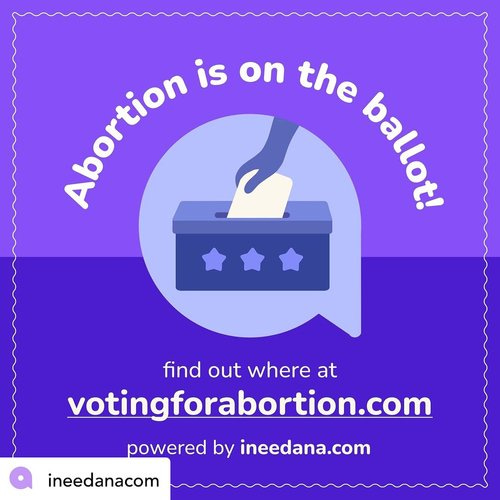We want to do our work. But many of us have deep and urgent feelings about the current state of reproductive freedom and justice. Today, Ramona is focussing on that.
A few weeks ago, I talked to filmmaker Meghan Ross who said she felt this pressure keenly living in the state of Texas while establishing herself as a filmmaker and negotiating the early stages of family planning. Every milestone she met with her project Here To Make Friends seemed to line up with an anti-choice milestone. Meghan began to feel that the conversations she and her friends were having around the choice to have children were inextricably linked with the choices being struck down all around them.
“It just feels like [abortion rights] has been embedded between my written work and my life plan…it's just been front of mind,” she said. “I can't separate the two.”
Eventually, before its festival run, Here To Make Friends premiered at an abortion fundraiser called “So Fucked It’s Funny” in LA.
Talking to Meghan, I remembered that we were on set with Ramona At Midlife the day we got the news about the Dobbs decision and losing Roe. It was Day 13 of a 15-day shoot, and we had a lot of pages to get through, and yet so many of us felt this really deep and urgent rage. Brian Slaten, the actor playing Ryan the hot playground dad, threw on a Planned Parenthood cap for his scene, and we kept it there all day.
Kellie Overbey is a friend and personal hero of mine. I knew and liked Kellie as an actor for years; I liked her even more when I learned that she and Martha Plimpton had founded A Is For, an abortion rights advocacy group on the frontlines of raising awareness and money for reproductive justice.
Last year, I served a juror for their playwriting contest and a moderator for a post-reading feedback session. It remains one of the highlights of my year. Here, I got to speak with Kellie for Ramona’s newsletter.
BB: Tell us about A is For and its origin story.
KO: Martha Plimpton and I were at a party with some friends in Los Angeles in the Spring of 2012, discussing Sandra Fluke, a college student who had been demanding coverage for birth control at Georgetown University and the vitriol that she subsequently experienced from conservative press and lawmakers. Rush Limbaugh had even gone so far as to call her a “slut” and a “prostitute” for simply seeking equal access to reproductive healthcare. Martha said, “They may as well have us wear the Scarlet A!”
We wanted to do more than grouse so we started meeting with the women who had been part of that original conversation, and others we had bonded with over the escalating attacks on reproductive healthcare. And A is For emerged. We reappropriated Hester Prynne’s scarlet A, intended as a symbol of shame, and re-claimed it. You decide what your A is for: Access, Advocacy, Autonomy, Abortion, Ain’t Nobody’s Business, etc.
We immediately started making A ribbons and fundraising for direct service providers. Since our founding, A is For has donated over $250,000 to clinics, abortion funds, and legal entities advocating for reproductive rights in the courts.
The primary mission is to amplify art and artists dedicated to busting abortion stigma and seeking to elevate the human experience of abortion. Stigma is pernicious. And surprisingly effective in getting people to act against their own best interests.
A is For's programs are designed to help people recognize and deconstruct misogynistic and racist narratives so that we can focus our attention, energy, and resources on reestablishing safe, legal, and stress-free access to reproductive healthcare.
We envision a world in which every person has access to the full spectrum of reproductive healthcare free from judgment, scrutiny, and obstruction.
BB: How has the organization changed since the 2022 decision to overturn Roe V. Wade?
KO: Martha always said, from the beginning, that our goal is to become obsolete. When abortion is safe, legal, and accessible for anyone who needs it, whenever they need or want it, then we can retire from this work. But the price of freedom is vigilance. Complacency and discomfort with discussing abortion kept a lot of “pro-choice” people from foreseeing Dobbs, and that was a mistake.
I would say the biggest change has been the uptick in people’s interest in what we do. That, and in collaboration with with support from Broadway Cares / Equity Fights AIDS, we worked to increase our monthly giving to direct service providers in need. There are so many places in need right now. Abortion bans and other restrictive abortion laws have decimated access to reproductive healthcare all over the country.
BB: How did you become involved with reproductive justice?
I’ve always been a feminist, even before I knew what to call it. My mother, grandmothers, aunts, mom’s friends—I just liked them. They cooked and cursed and played bridge and put together dirty Playgirl puzzles. They included me in conversation about anything and everything. So I felt respected by them. They were all strong, smart, and funny. And they were Democrats. In Kentucky. People ask me what religion I grew up with, and I always say Southern Democrat.
The message of that era was “You’ve come a long way, baby,” the tagline from a Virginia Slims ad of the time. Growing up in this environment, even in the Bible belt, I had the feeling that I was inheriting my right to equality. I was excited to go out into the world and do anything I wanted. And I guess, to a greater or lesser degree, I have.
But what I identified at the time as a launching pad turned out to be the moment when our country pushed off against the side of the pool and started swimming in the other direction. I’m awfully sad that at this point I will be a very old woman when I see all this damage undone. If I am lucky enough to live that long.
I would also like to say that I have a lot of hope in the generations coming up behind me. I’m sorry we’ve crippled them with smartphones and social media and climate disaster, but at least they are very keen about having and keeping their personal agency, and I do think that’s progress.
Another thing I am grateful for is my own evolution as an advocate. I have always been on the side of women. But I have grown to realize—and I think it’s imperative that we all realize—reproductive justice is not just about women. Trans men, non-binary people, kids under 18—sometimes as young as 10 years old—all need access to safe, legal abortion care. And none of those people are women. Which is why I intentionally use the phrase "pregnant person," or "patient." As in "to save the life of the patient." (Which is not an actual thing that happens, apparently.) Or I will say “women and other pregnant people.” Also don’t forget, women are people.
Every day I hear news pundits and people in casual conversation discussing abortion (the good part) but then sliding back into anti-repro-rights framing (the bad part.) The way they talk about motherhood betrays a fetishization.
You would not call a pregnant trans man a mother.
You would not call a pregnant non-binary person a mother.
You would not call a pregnant 10-year old a mother.
And you should not call a pregnant person (who does not have any children and/or does not want to have any children) a mother.
Using mindful and accurate language is a political act of resistance, a refusal to adopt the framing of your oppressors. Language is powerful, and when you choose your words with care and thought, you are powerfully advocating for the rights of your fellow human beings.
And of course the stakes are higher for people of color and other marginalized groups. The intersectionality of abortion rights and racism and misogyny and ableism and transphobia is profound. Bottom line: if you think these increasingly oppressive laws currently going into effect all over the country don’t apply to you, you’re wrong. Whether you have a uterus or not.
BB: Is there anything upcoming artistic projects you are particularly excited about or eager to share? The A is For benefit? The playwriting contest?
Both of those things, yes! Our annual gala Broadway Acts for Abortion is coming up on Sunday, October 6th. It is the only recurring Broadway community fundraiser dedicated to reproductive rights. This will be our 8th BAfA!
It’s an evening of celebrity karaoke and auctions where guests bid on very cool prizes and the chance to choose which song will be sung by our Broadway stars. We’ve presented everything from Betty Buckley’s masterful interpretation of Radiohead's High and Dry to Sara Barellis bringing down the house with Bridge Under Troubled Water. We have some incredible performers and prizes this year, and I am very excited for it.
And with regard to the play contest, as of today we have 355 plays submitted! We are accepting submissions until October 18th, so if you have a one-act play about reproductive justice you would like to send, please do!
Theatre allows us to intimately envision ourselves from new angles and without limitations. To be safe exploring unfamiliar ideas. This playwriting contest and festival supports and promotes artists who speak truth to power, challenge entrenched narratives, and boldly reframe conversations about reproductive justice.
We look for diversity in perspective as well as imagination. We hope to receive a wide range of works reflecting the great variety of experiences that reproductive justice and/or bodily autonomy demands we all recognize.
While the bulk of our 2023 submissions were from the United States, we also received plays from 13 other countries! Reproductive justice and bodily autonomy are global issues. We are all connected.
And finally, our newest program is the ABC Abortion Book Club. It’s free! We have our second meeting on October 24th to discuss Killing the Black Body by Dorothy Roberts. Please sign up! Even if you haven’t read the book yet!
If you have questions about A is For, please check out our website aisfor.org or email me at koverbey@aisfor.org.
One last plug from Brooke…
At the Omaha Film Festival this year, I had the honor of seeing the amazing, funny, moving documentary No One Asked You! I have not stopped thinking about it.
Comedian, disruptor-extraordinaire Lizz Winstead (co-creator of The Daily Show), and Abortion Access Front crisscross the U.S. to support abortion clinic staff and bust stigma. Pop culture icons and next-gen comics fuel this six-year road film, activating small-town folks to rebuild vandalized clinics, exposing wrongdoer politicians, anti-abortion extremists and media neglect as the race to the bottom ensues and our rights burn down. No One Asked You is a bold call to action driven by the power of humor in social change, where joy prevails.
The people behind this amazing film (including director/producer Ruth Leitman) just launched a Resist Through Laughter screening series, focused on screening the film in battleground states and states where abortion is on the ballot before the election. AAF is partnering with badass activists across the country, with the goal of bringing joy and laughter to the fight for abortion access.
All of the screening info can be found here.
Ramona is back to a bimonthly schedule, so meet you back here October 18 for musings on collaboration and friendship and coming up, a spotlight on doc filmmaker and producer Daphne McWilliams.
Thank you for reading! As always if you like what you see here, please share with your bestie, frenemy, work buddy, a mom on the playground or all of the above.
Love, Brooke
PS: Are you registered to vote?




